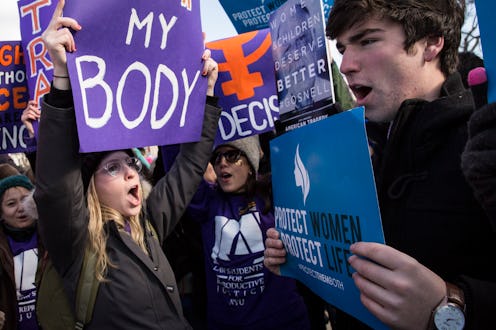News
Here's Exactly How The GOP's "Heartbeat" Bill Would Stifle Abortion Access

The assault on women's reproductive rights by Republicans continues Wednesday as a House subcommittee holds a hearing on a "heartbeat" bill which would ban abortions after around six weeks of pregnancy. One of the many problems with this legislation is that many women don't find out they're pregnant until the sixth week of pregnancy or later — which, if the heartbeat bill becomes law, would be too late to obtain a safe and legal abortion by then.
According to the American Pregnancy Association, most women find out they're pregnant during their fourth to seventh week of pregnancy. That means that those who find out they're pregnant between weeks six and seven would be unable to have an abortion under the heartbeat bill — and that's not to mention the women who discover they're pregnant even later still. It's named this because that's the measure for whether an abortion would be allowed — if a heartbeat can be heard.
That is in essence it's another way to frame a gestational limit: restricting abortion based on how far along a woman is into her pregnancy. Gestational limits are not new. Roe v. Wade allows them after 24 weeks of pregnancy, when a pregnancy is considered viable, and many states have instituted this kind of limit. The discussions around this bill tend to use the six-week mark.
Whether women would truly be denied abortions at six weeks into their pregnancies is a bit tricky. The summary of the law before Congress, H.B. 490, says it would be "a crime for a physician to knowingly perform an abortion: (1) without determining whether the fetus has a detectable heartbeat, (2) without informing the mother of the results, or (3) after determining that a fetus has a detectable heartbeat."
Even if the fetal heartbeat begins at six weeks, it often can't be heard until later in the pregnancy, even with advanced technology. With a fetal Doppler, a handheld ultrasound, it usually can't be heard until 10 or 12 weeks into a pregnancy. That means women would potentially be able to get an abortion as late as 11 or 12 weeks, as long as the doctor doesn't detect the heartbeat on the monitor.
Regardless of the ban being at six or 12 weeks, it would be in violation of the Constitution, since the Roe v. Wade ruling affirmed women's right to an abortion until fetal viability, which is at 24 weeks. Even the 20-week abortion bans in some states are unconstitutional — even if they haven't been heard by the Supreme Court (the court has declined to take up lower court rulings that found such bills unconstitutional).
This hasn't stopped conservatives from trying to pass similar legislation before. Some states have pushed for similar six-week "heartbeat" abortion bans, but they have always been struck down by federal courts. Ohio controversially passed a heartbeat bill last year but it was ultimately vetoed by Gov. John Kasich, who instead he passed a 20-week ban. Before the veto, conservatives saw Ohio's six-week ban legislation as a potential way to challenge Roe v. Wade.
Given that H.B. 490 would be a federal law if passed, the limit would apply to the whole country. It's the first such bill introduced, and its chance of approval are slim-to-none. That said, the fact that it's up for debate at all shows that conservatives are adamant about challenging Roe v. Wade in the upcoming years.
When he introduced this current bill in January, far-right Iowa Republican Rep. Steve King made it clear his goal was overturning Roe v. Wade. "By the time we march this thing down to the Supreme Court, the faces on the bench will be different — we just don’t know how much different, but I’m optimistic,” King said at a press conference, referring to the possibility of President Trump appointing anti-abortion justices to the court in the coming years.
Neil Gorsuch's appointment maintains the longtime 5-to-4 abortion rights majority. But one more replacement of a liberal judge with a conservative could swing that equilibrium the other way.
Meanwhile, King's goal is to ban as many abortions as possible. "We think this bill properly applied does eliminate a large, large share of the abortions — 90 percent or better — of the abortions in America," King said in January.
If you oppose this kind of legislation, make sure to contact your senators and representatives. The more that this is debated in Congress, the more it normalizes it. Even if it doesn't have a chance of passing, it must still be opposed.